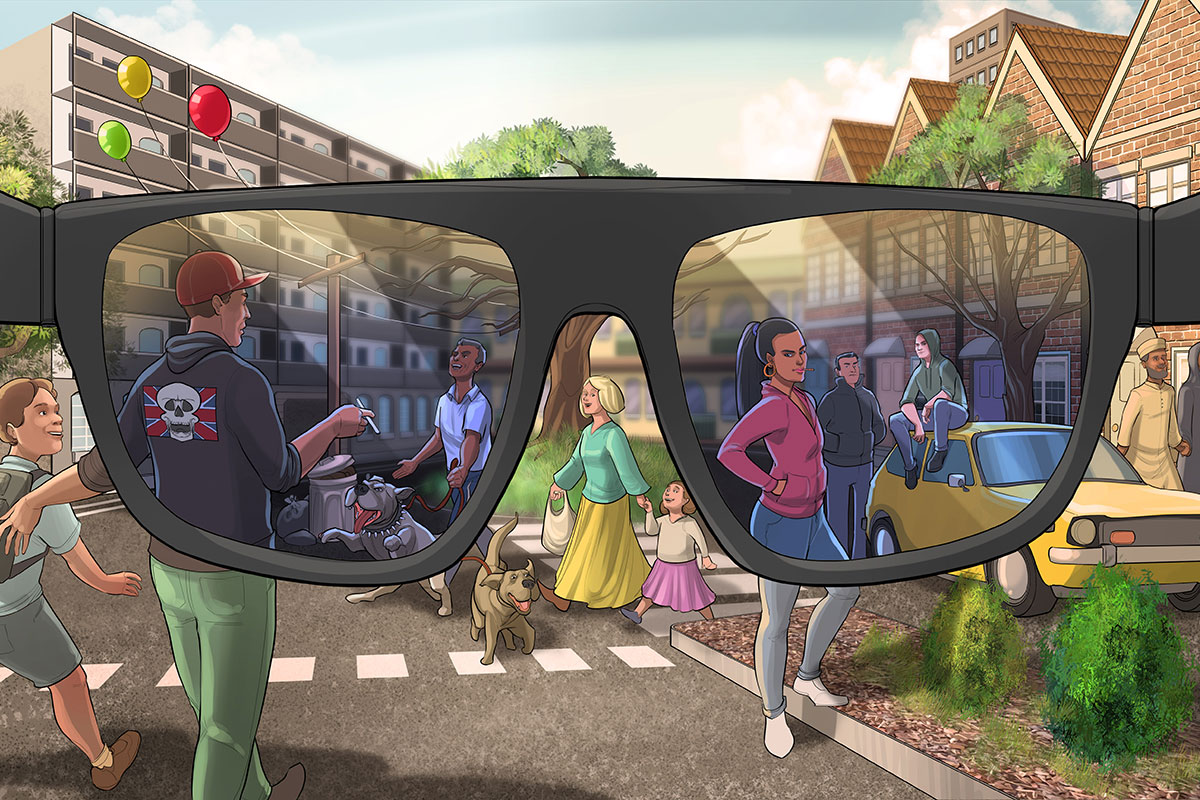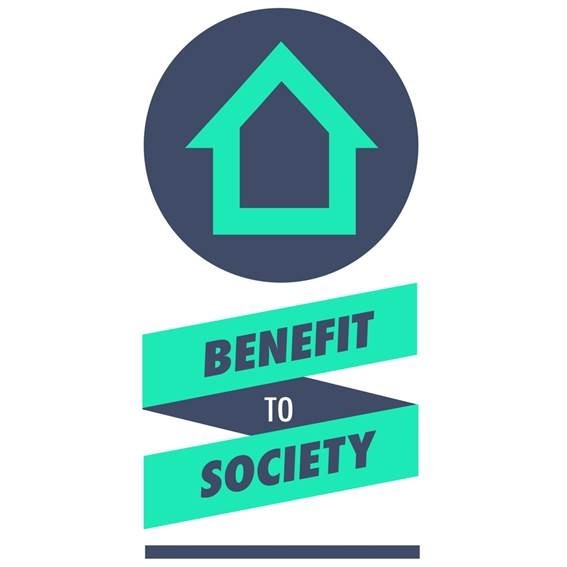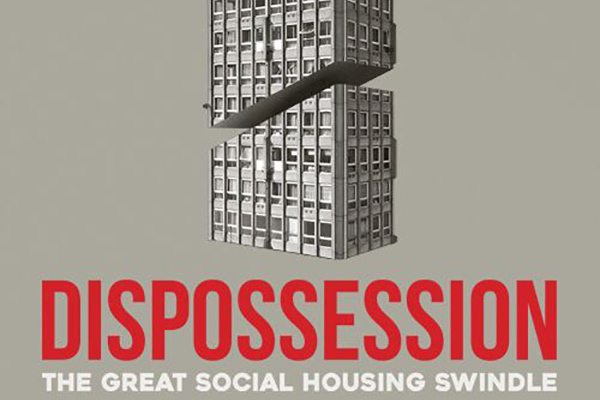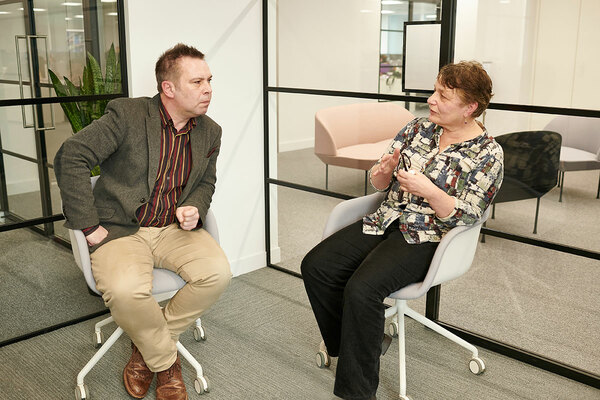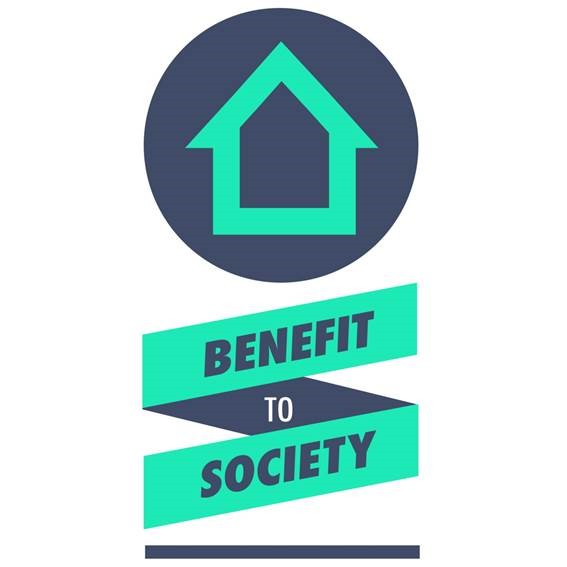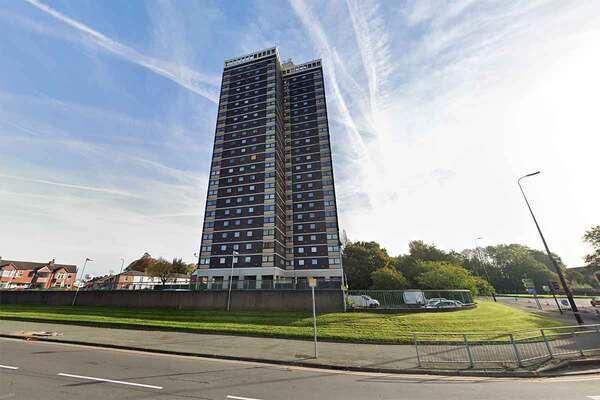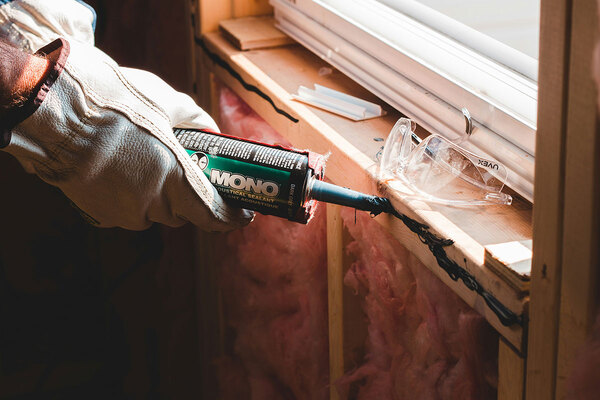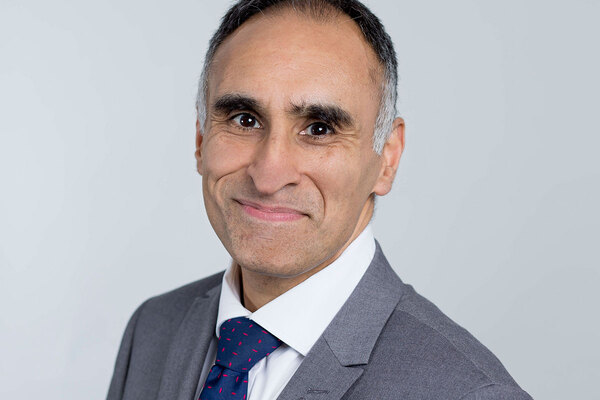You are viewing 1 of your 1 free articles
A tinted view: negative media portrayals of social housing
Since Grenfell, serious questions have been asked about the way social housing is portrayed by the media and politicians. Alex Turner visited tenants to find out what they think about the state of play. Illustration by Bill Hope
A striking photo of the ‘Seven Sisters’ illustrates the business card of Rochdale’s College Bank tenants’ and residents’ association (TRA).
Next to the high-rise blocks, the card’s tagline reads: ”Urban living with unrivalled views.”
This aspirational image of life on the estate is quite a contrast to what we’ve been discussing inside the TRA’s offices: the stigma facing the people who live in social homes.
The subject has had plenty of attention over the past few months.
A campaign sponsored by 30 housing associations, Benefit to Society, which Inside Housing backs, has sought to push back against disrespectful portrayals of social tenants as people living off the state, in a housing tenure of last resort.
But how did we get to the sad state of affairs in which people are stigmatised by who their landlord is or where they live? Have things got worse recently, and why? And are landlords countering or contributing to the problem?
To explore these questions, we visited dozens of people renting social homes and living on estates across England.
We interviewed people involved in their landlords’ participatory structures, members of independent residents’ associations, activists opposing their housing associations, and tenants attending drop-in sessions. We also spoke to various industry figures, academics and others.
Our conversations threw back few easy answers, but shone plenty of light on how the words and actions of those with power – including social landlords – can conspire to denigrate people living in social housing.
Several tenants we visited on large council-run or stock-transferred estates, which are often clearly differentiated from surrounding streets, point out that it is nothing new for people to be stereotyped based on living in such locations. It’s a process academics have called “territorial stigmatisation”.
“People have short memories,” says Andrew Johnson, 56, as we sit round a table at College Bank in Rochdale. “Going back to 1970s Bury, my school was overwhelmingly working class, and there were, absolutely, pecking orders in terms of stigma.
“Teenagers weren’t stood in the playground discussing the nuances of social class,” he continues with a grin. “But some things were implicit – if you lived on the Springs or Dicky Bird estates, those were the ‘worst’ neighbourhoods.”
Housing association tenants living in ‘street properties’ scattered among privately owned terraces – of which there are many thousands – offer a different perspective.
“We used to just be people living in rented housing,” says Lizzie Spring, 64, whose flat sits on a grand stuccoed street, a stone’s throw from Grenfell Tower.
She moved into an association home having been part of the squatting and housing co-operative movement. In the 1970s and 1980s, both squatters and housing associations occupied and renovated thousands of neglected period homes – now prime real estate – in London.
“You paid your rent, went to work, brought your family up – it was completely mainstream,” Ms Spring says of her experience as a tenant during the Thatcher years.
“We used to just be people living in rented housing,” Lizzie Spring
“It used to be, ‘Council estates – blighted by crime’,” adds Molly Ayton, 64, who has lived in her West London maisonette for 39 years. “I don’t remember bad press about housing associations.”
While their housing histories are varied, one thing most people we talk to agree on is that the quantity and intensity of bad press about social housing and its tenants has increased.
At Foxhill in Bath and Gleadless Valley, Sheffield, several residents express anger at media coverage of violent crimes in their neighbourhoods.
Too often, they say, estate names end up featuring prominently, influencing readers’ perceptions, even when perpetrators actually live somewhere else.
Images or footage showing estates in as bleak a light as possible – epitomised by Channel 4’s 2005 ‘ident’ (below), in which its logo took shape on London’s Aylesbury Estate, styled as a decaying wasteland – are another bugbear.
In the wake of Labour’s Decent Homes programme, and the large-scale demolitions that took place around the same period, dilapidated social housing is harder to find. Yet, the stereotype persists.
In Rochdale, Mr Johnson points out that a 2017 BBC One Show segment, on the campaign to save the Seven Sisters from demolition, lingered on a shot of a scruffy balcony adorned with faded England flags. There were “loads of others with beautiful hanging baskets” that could have been chosen, he says.
But over the past few years, interviewees have felt that media coverage has been growing more hostile, and shifting the focus of stigma from places to people.
For a number of years Lower Falinge, the estate over the road from College Bank, has been “the go-to place for workshy scroungers, if that was this week’s fashionable media story”, says Mr Johnson.
In 2010, The Daily Telegraph called it “Britain’s worst welfare ghetto”. It’s a description that locals argue took little account of the barriers – for instance around languages, or ill-health – some residents face in getting work.
This decade has also seen the rise of the reality TV genre now known as poverty porn, which Paul Sng, the director of the 2017 housing documentary Dispossession: The Great Social Housing Swindle, suggests was unwittingly enabled by fictional shows such as Shameless. Poverty porn has focused, often sensationally, on individuals with troubled lives, living on benefits.
"This decade has also seen the rise of the reality TV genre now known as poverty porn"
“Channel 4’s Skint was set on the Westcliff Estate, where I grew up in the 1970s,” says Tim Mills, 54, from Scunthorpe. “It’s still very close-knit, but Skint portrayed it as all benefit scroungers – there are a small minority like that, but TV concentrates on them and gives a false impression.”
While no one we speak to suggests turning a blind eye to problems on estates, questions of balance – and of ignorance – come up time and again.
“People making these programmes have probably not lived in those areas,” points out Kate Lowerson, 47, who we talk to in Rochdale. “Maybe people from those backgrounds, who actually understand the issues, should make them.”
Of course, the rise of such portrayals has not happened in a vacuum.
Over the long term, the attritional effect of the Right to Buy on stock numbers has ramped up the proportion of people accessing social homes who are in acute housing need – including many living unstable lives.
“Half of our housing has been sold,” says Paul Smith, Bristol council’s cabinet member for housing.
"On an estate you can often spot the ones in the private rented sector because they are run-down," Lilian Shears
“It’s rationed and allocated to the most vulnerable people, concentrating deprivation as a social policy,” adds Mr Smith, who grew up on the city’s Hartcliffe Estate before embarking on a career in the social housing sector.
In Rotherham, Lilian Shears, 60, expresses frustration that properties sold under the Right to Buy, then rented out, are now dragging down the image of council estates. (Inside Housing research suggests around four in 10 sold-off council homes are now in the private rented sector.)
“We have all had upgrades, so council homes are better looking,” Ms Shears says. “On an estate you can often spot the ones in the private rented sector because they are run-down.”
Post-2010, meanwhile, welfare reforms such as the bedroom tax have been seen as punishing low-earning social housing tenants. The David Cameron-era fixation on homeownership, and the introduction of measures such as fixed-term tenancies, have also entrenched the image of social homes as temporary refuges for the most vulnerable.
Benefit to Society
A group of 14 associations and their tenants have got together to challenge common narratives about social housing residents through a campaign called Benefit to Society.
As part of this, the campaign has produced a Fair Press for Tenants guide to help journalists portray social tenants and social housing fairly.
Inside Housing is backing the campaign and will help fact-check and scrutinise articles that portray tenants in a negative light.
Send examples of unfair, misleading or inaccurate reports about social housing tenants to carl.brown@insidehousing.co.uk.
“The move towards fixed-term tenancies in England represents an existential change in the nature of social housing,” says Beth Watts, an academic specialising in housing and social policy at Heriot-Watt University. “It contributes to a broader denigration of the tenure, and decline in the quality of experience of being a social housing tenant.”
Beside specific policies, many people we interview describe harsh rhetoric from politicians – notably Mr Cameron’s pledge to “bulldoze sink estates” – as damaging, anxiety-inducing, and fuelling negative media stories.
“The move towards fixed-term tenancies in England represents an existential change in the nature of social housing,” Beth Watts
Others add that the wider policy landscape of austerity and service cuts has left residents on low incomes feeling psychologically, as well as financially, under attack. At the same time, several point out, some estate environments have declined as staff resources shrink and businesses close.
“It becomes a vicious circle – people say, ‘No one cares about us,’ they get low and nothing changes for the better,” says Iren Wadsworth, 49, one of the group of residents we meet in Sheffield.
“They don’t get as inspired to go, ‘We can do something about it’,” adds Ms Wadsworth, who is one of many people we speak to who volunteer in their communities.
In discussing the words and actions of politicians, people we talk to repeatedly return to a criticism best summed up by Rev David Middleton, the vicar of the Gleadless Valley Holy Cross Church.
“It’s all about a lack of insight,” says Rev Middleton simply. “I would love it if people in power, someone from the government, would actually come and have a look at our estate.”
The narrative of politicians and senior media figures viewing the world from ivory towers is well-worn. Worryingly though, many social tenants we interview also talk of a sense of detachment growing between landlords and the communities they serve.
Only a small minority describe patronising behaviour by individual staff. Rather, people talk of organisational cultures and processes that seem disempowering, leaving tenants feeling done-to rather than respected.
We meet anti-demolition campaigners who describe consultation processes that offer little in the way of choice, and scant understanding of existing communities’ value. We visit residents whose landlords are involved in mergers, who recount issues of disrepair and the frustrations involved in dealing with organisations that, to them, seem larger and more distant.
We speak to people angry that their housing associations appear to prioritise commercial interests, such as by selling off properties in central London postcodes.
"Landlords often argue that these dissenting voices are in the minority"
And we hear from others concerned about the loss of tenant voices from boards.
Landlords often argue that these dissenting voices are in the minority – and we also interview plenty of people who say they feel valued, included in decision-making and able to hold their landlord to account.
Matthew Bromley, 48, from Kent, is involved in his own landlord’s participatory structures and is full of praise for the way it operates. But, Mr Bromley goes on, his impression is that many housing providers involve tenants on a more tokenistic basis. “If your landlord will only engage because it ticks a box, that is stigmatising – it is disrespectful,” he says.
In London, Ms Spring – who has established a forum in Kensington and Chelsea to explore different models of community-led housing – suggests tenants have become “infantilised”.
“[The sector] has been presenting the tenant body as ‘the most needy and vulnerable’, a phrase that’s used endlessly,” she says. “In fact, most of us have worked all our lives, but have become invisible.” Last year, government statistics put the average age of social tenants at 52, with 7% unemployed - the overall unemployment rate in the UK is 4.9%, although this only counts working age adults.
Mind your language
Casual use of terms such as ‘sink estate’ by politicians and media outlets has caused controversy and anger over the years – but our interviews with people living in social homes throw up a number of other contentious terms.
The debate over whether they should be called ‘tenants’ or ‘customers’ shows no signs of abating. Some interviewees take the line that ‘customer’ sets an expected service standard, while others argue that it demeans the legally defined tenant relationship and implies a level of choice that does not exist.
The name of the Benefit to Society campaign is another source of some division. In London, Lizzie Spring says she feels it still pigeonholes tenants, using a loaded word. “It makes me want to stop doing any of [my voluntary work and other activities], learn how to smoke cigarettes and buy myself some beer – being a benefit to society should have nothing to do with whether I rent,” she says.
People on the campaign’s steering group understandably take a different tack, seeing the name as a way of actively reclaiming a term that has become shorthand for leeching off the state.
Several people we talk to say the catch-all phrase “social housing” is problematic. Some argue that ‘social’ is simply attached to too many descriptions that people now associate with negative connotations – including socialism, anti-social behaviour and even social worker.
“It means a poor man’s house, and it’s always been that way,” adds Bill Claydon, 71, who we meet in Sheffield. “You hear it on TV, social housing. You would never hear ‘private housing’ used the same way – it’s that class distinction, and the name enforces it.”
A number of interviewees say that the perception that tenants should be grateful to have a home creates an unhelpful power dynamic.
“I see [my housing] as I do my bank – it’s transactional, they work for me,” says Maryanne Kempf, 50, from Bristol, who has paid rent to the same association for two decades.
“Leases now are very different, with lots more clauses, like a year of ‘suck it and see’, so people are less sure of their footing,” adds Ms Kempf, who has worked extensively with women affected by domestic abuse and in housing need. “Tenants really feel quite vulnerable now.”
Senior housing figures we speak to – while understandably reluctant to make sweeping statements about the sector – accept that our interviewees’ concerns need to be addressed.
“My bugbear is hearing landlords talk about turning people’s lives around – there’s a bit of paternalism,” says Catherine Little, assistant director of strategy and governance at 6,500-home Soha Housing.
“Most people just need an affordable home,” adds Ms Little, who helped organise the Benefit to Society campaign. “If people have things they need to overcome, they do it themselves – yes, with the right support, but you shouldn’t take credit for what they achieve.”
Tony Stacey, chief executive of 6,000-home South Yorkshire Housing Association, concedes that some associations have “unconsciously” moved towards ‘othering’ social tenants.
"But can the UK – and England in particular – ever move to a point at which we stop prejudging people by their housing tenure?"
“I think it’s the result of trying to keep up with the government agenda [during the Cameron era],” he says. “Four years ago, the assumption was that we’d never see a Labour government again – so you have to get with the programme and move with that political wind, or be dead in the water.”
Mr Stacey stresses that he doesn’t believe most landlords have truly lost their way. It’s a viewpoint mirrored by Bristol Council’s Mr Smith, who says he feels many organisations remain “incredibly committed to social housing and to local accountability”.
Nonetheless, he adds, in his opinion the distance between people who run organisations and receive services has got bigger.
“In the 1980s, there were lots of people who came from council housing in leading positions – but now, looking at the new generation, there doesn’t seem to be so much of that,” Mr Smith continues. “You can have CEOs on six-figure salaries sitting in judgement of people trying to make ends meet on four figures.”
Mr Smith expresses concern about the marginalisation of tenants’ voices from association boards, as well as the professionalisation of roles that do come up. “If you look at ads for board places, they are often for people with finance or business skills,” he says. “I’ve not seen one that says, ‘We want someone with good experience of living in a working-class community’.”
He singles out ‘the lesson of, we really need to listen more’ as being something the sector must get to grips with, post-Grenfell.
Since the disaster 10 months ago, which followed unheeded warnings from residents, there has been much talk of a new sense of respect for people living in social housing. In Rotherham, Ms Shears, who dryly sums up the public perception of tenants as “dole wallahs, drug addicts, alcoholics – generally the dregs of life”, says she feels negative media portrayals have “abated slightly”.
A number of interviewees say they were impressed by former housing minister Alok Sharma’s decision to tour the country listening to tenants after the fire, and are looking forward to the Social Housing Green Paper set to follow this spring. There’s frustration though, over what the revolving-door nature of the ministerial post says about the government’s level of esteem for social housing.
“I spoke to [Mr Sharma] and said, ‘I get a good impression from you, that you want to make a change’,” recalls Mr Bromley. “I asked for guarantees about what would happen after he was shuffled off – and within six weeks he was.”
Mr Bromley is one of three tenants we interview who are involved with Benefit to Society, which recently launched a report into social housing stigma and has produced a media code of conduct.
All are enthusiastic that the campaign is gathering momentum, and say they’re positive that tenants rather than housing bosses are taking a lead. Ms Little adds that as its Facebook reach grows, she hopes its influence will spread beyond sector workers and residents to “people most likely to have stereotypes, and consume media that backs them up”.
Others say more powerful, independent tenants’ bodies are needed to redress the balance.
But can the UK – and England in particular – ever move to a point at which we stop prejudging people by their housing tenure?
“If the government starts doing, as well as saying, the right things it might make a positive contribution,” says Ms Shears carefully. “But I think we’re just a society that likes to put people in boxes.”
Against 2018’s backdrop of divisive politics, Brexit recriminations and social media bile, it’s a hard assessment to argue with.
